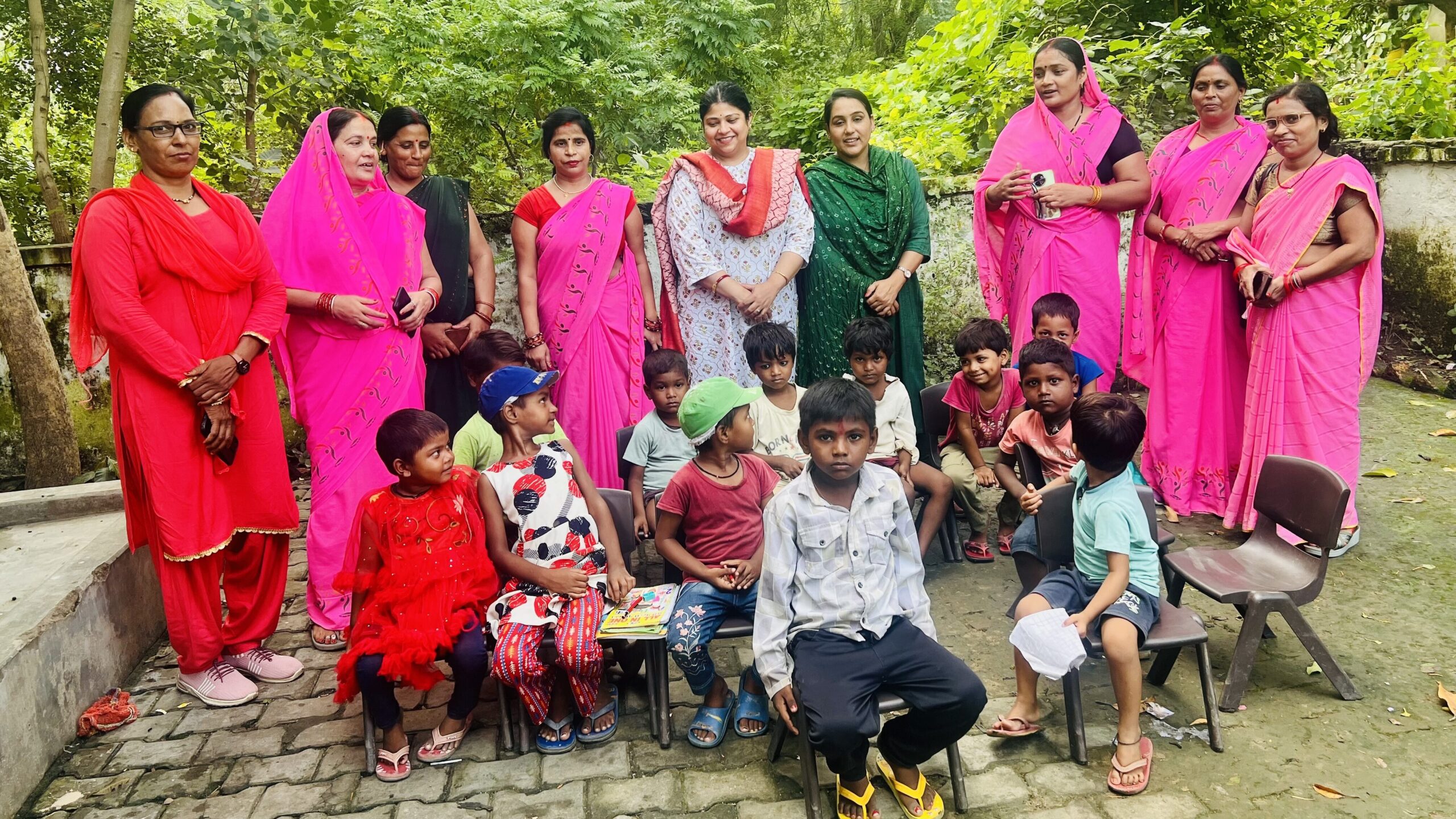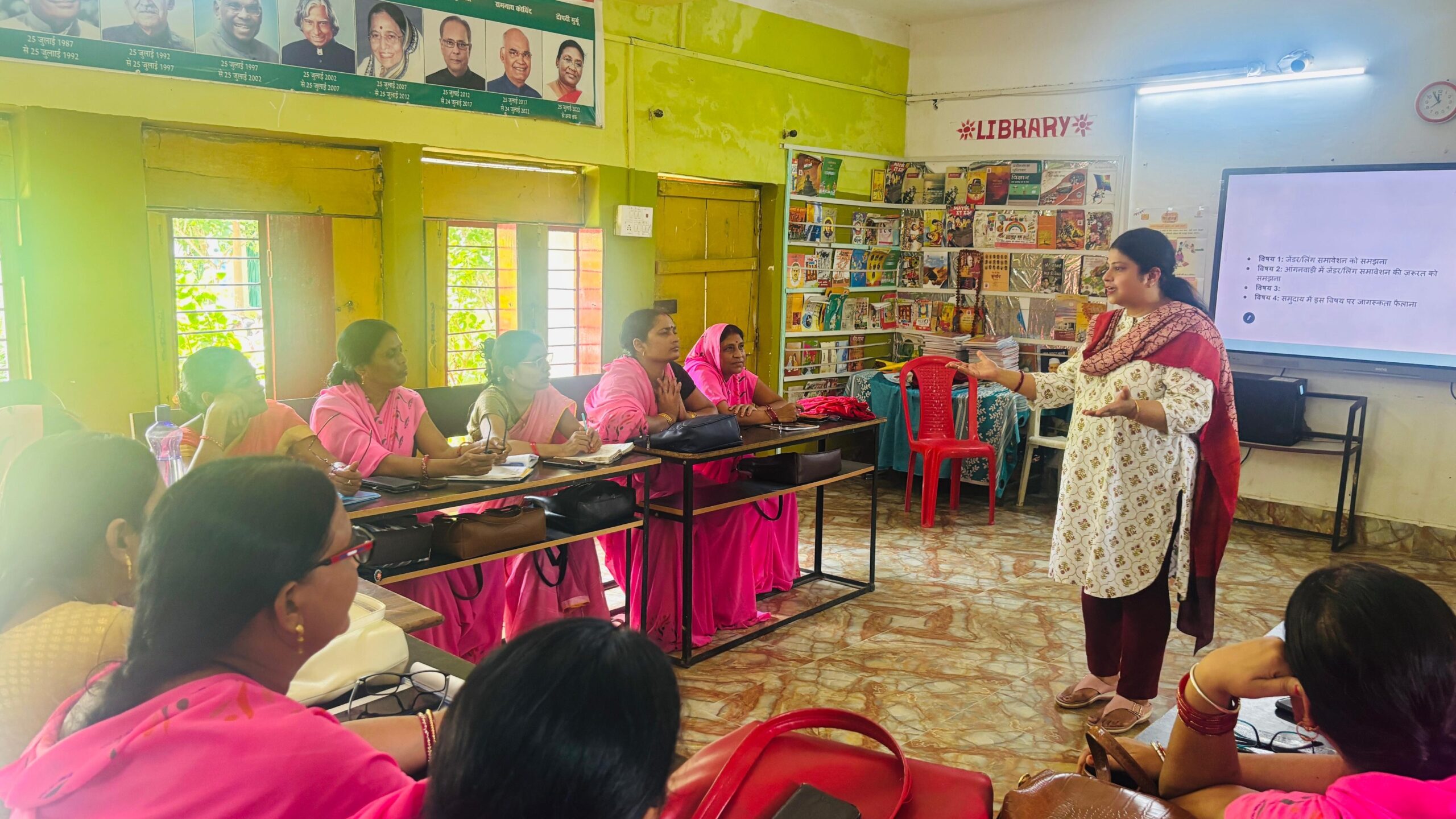– By Vasudha Arabandi, National Initiatives and Communications Associate
As India marks the 8th National Poshan Maah alongside the Swasth Nari, Sashakt Parivar Abhiyaan, the focus on women and children’s health, nutrition, and family well-being is more important than ever. This edition of Drivers of ECCE dives into the intersection of health, nutrition, and gender equity, exploring how these elements shape early childhood development and the nation’s future.
We speak with Dr Aparna Mukherjee, our Deputy Strategic Lead, Health and Gender Equity, who brings extensive experience across the United Nations, government systems, and grassroots communities. Aparna shares how empowering women, strengthening Anganwadi services, and integrating nutrition with early learning can break intergenerational cycles of malnutrition, nurture every child’s potential, and advance India’s national agenda for equitable growth, healthier families, and a Viksit Bharat.


Q: What personal experiences shaped your passion for working at the intersection of health, nutrition, and gender?
Dr Aparna Mukherjee: My passion for this work was shaped during my PhD, when I lived for months together in one of India’s most disadvantaged districts. I saw girls being pulled out of school far earlier than their brothers, adolescents becoming mothers too soon, and women consistently placed last – whether in meals, health check-ups, or access to information; leaving their nutrition, well-being, and agency compromised. Those experiences showed me how deeply nutrition, health, and rights are connected, yet unequally shared. Later, in my work with various agencies and communities, I learned that these inequities go beyond individual behaviours, they intersect across gender, age, class, and power. That perspective convinced me that placing women and children at the centre is not optional, it is the foundation of equitable health, nutrition, education, and development, and the key to shaping a more just future.
Q: In your role at Rocket Learning, how do you bring these themes together to strengthen early childhood development?
Dr Aparna Mukherjee: I try to bring health, nutrition, gender, and education together as one story of early childhood. It starts in the first 1,000 days and continues into the preschool years, because survival, growth, stimulation, and learning cannot be separated. As the government has rightly emphasised, ‘Poshan bhi, Padhai bhi’ captures the essence of what children need in their earliest years. I am trying to bring these themes together by embedding health and nutrition messages into our digital parenting journeys, aligning them with early learning content, and ensuring they converge with government platforms like ICDS and Poshan Tracker.
Also, a big part of this is rethinking gender, ensuring mothers are supported, fathers are engaged, and Anganwadi workers are not seen only as delivery agents, but as empowered change agents who can counsel families and shift norms.
Q: Why do the first six years matter so much for a child’s nutrition and future?
Dr Aparna Mukherjee: The first six years are not just the foundation of a child’s life, they are the bedrock of a nation’s human capital. In the first 1,000 days, nutrition and care determine survival, growth, and brain development. Between ages three to six, children build the language, social, and learning skills that shape their schooling. When this early foundation is strong, children grow into healthier, more capable adults who drive productivity, innovation, and progress. But when even one element is missing like nutrition or stimulation – the lag is hard to catch up later in life. That is why the first thousand days, and the early years up to six, matter so much.
Q: How do gender roles at home affect what children eat and who gets fed first?
Dr Aparna Mukherjee: Gender plays a powerful role in shaping a child’s nutrition and health. It determines not only who eats first, but also the quality of food they receive, the size of their portion, the diversity of their diet, and even who controls the decision about what is cooked and served. Evidence shows that in many disadvantaged households, nutrient-rich foods like milk, eggs, or fruits are often reserved for men and boys, while women and girls are left with smaller portions, less variety, or leftovers. Added to this is the burden of unpaid work and time poverty, which reduces the time mothers can spend on their own nutrition or on feeding practices for children. These patterns compromise maternal health, which in turn affects child survival, growth, and learning, reinforcing cycles of poor nutrition across generations. That is why addressing gender roles within households is central to ensuring every child gets an equal chance to thrive.
Q: How does a mother’s health and empowerment shape her child’s nutrition?
Dr Aparna Mukherjee: Yes, offcourse, a mother’s health and empowerment are two of the strongest predictors of a child’s nutrition. A healthy, empowered mother is often described as the child’s first line of protection. When women are free from anaemia, have the freedom to access health services and resources without barriers, and are equipped with the right information, they are able to participate meaningfully in household decisions. In such situations, children are more likely to be exclusively breastfed, introduced to diverse foods at the right age, and cared for with timely health and nutrition practices. Evidence consistently shows that children of mothers with better health, education, and decision-making power have stronger growth and nutrition outcomes. That is why prioritising women’s health and empowerment is not separate from investing in children, it is a direct investment in their growth, nutrition, and development, and central to achieving nurturing care for every child.
Q: In line with this year’s theme ‘Swasth Nari, Sashakt Parivar’, how can we ensure women’s nutrition and well-being become central to stronger families and brighter futures for children?
Dr Aparna Mukherjee: In line with this year’s theme ‘Swasth Nari, Sashakt Parivar’, we must recognise that women’s health and nutrition are the first building blocks of family well-being. Evidence from National Family Health Survey (NFHS)-5 shows that over 57% of Indian women and 67% of children under five are anaemic. Maternal anaemia is strongly associated with low birthweight, stunting, and poor learning outcomes in children. This year’s Poshan Maah and the Swasth Nari campaign, lakhs of health camps for screening anaemia, NCDs, and maternal health showed that platforms already exist. We must make them work for women as a matter of right.
Q: When you think about India’s dream of a Viksit Generation of children, what is your biggest wish for them?
Dr Aparna Mukherjee: When I think of a Viksit Generation, my biggest wish is simple: that no child’s future is limited by gender, birthplace, income, or circumstance. If every woman can nourish herself with dignity, and every child — girl or boy — grows up with the same care, food, and opportunities, we will have truly invested in a Viksit Bharat. This is the most powerful and lasting foundation for development.
Every child should start school healthy, well-nourished, safe, and curious. Through our programme, we aim to make this possible by combining nutrition with responsive caregiving, applying a gender lens, engaging fathers and other caregivers, and ensuring public systems respond to children who need them most.
With nearly 165 million children under six, India must invest in these early years to unlock its demographic dividend. My wish remains: no child is held back, and every child’s potential is nurtured today.